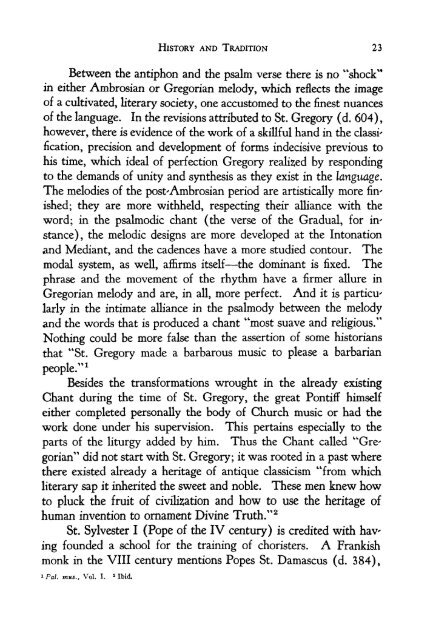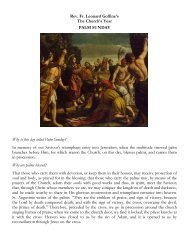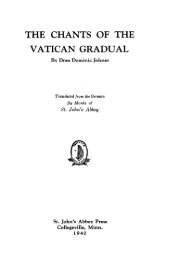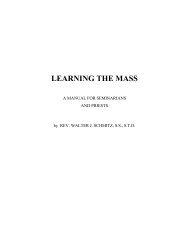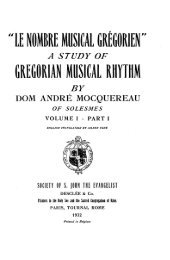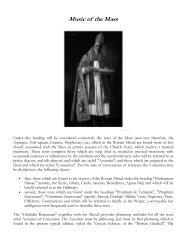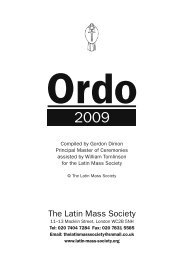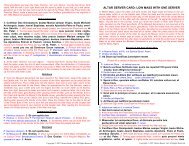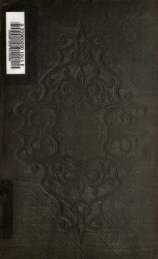The Spirit of Gregorian Chant - Church Music Association of America
The Spirit of Gregorian Chant - Church Music Association of America
The Spirit of Gregorian Chant - Church Music Association of America
Create successful ePaper yourself
Turn your PDF publications into a flip-book with our unique Google optimized e-Paper software.
HISTORY AND TRADITION 23<br />
Between the antiphon and the psalm verse there is no "shock"<br />
in either Ambrosian or <strong>Gregorian</strong> melody, which reflects the image<br />
<strong>of</strong> a cultivated, literary society, one accustomed to the finest nuances<br />
<strong>of</strong> the language. In the revisions attributed to St. Gregory (d. 604),<br />
however, there is evidence <strong>of</strong> the work <strong>of</strong> a skillful hand in the classification,<br />
precision and development <strong>of</strong> forms indecisive previous to<br />
his time, which ideal <strong>of</strong> perfection Gregory realised by responding<br />
to the demands <strong>of</strong> unity and synthesis as they exist in the language.<br />
<strong>The</strong> melodies <strong>of</strong> the post'Ambrosian period are artistically more fin'<br />
ished; they are more withheld, respecting their alliance with the<br />
word; in the psalmodic chant (the verse <strong>of</strong> the Gradual, for in'<br />
stance), the melodic designs are more developed at the Intonation<br />
and Mediant, and the cadences have a more studied contour. <strong>The</strong><br />
modal system, as well, affirms itself—the dominant is fixed. <strong>The</strong><br />
phrase and the movement <strong>of</strong> the rhythm have a firmer allure in<br />
<strong>Gregorian</strong> melody and are, in all, more perfect. And it is partial'<br />
larly in the intimate alliance in the psalmody between the melody<br />
and the words that is produced a chant "most suave and religious."<br />
Nothing could be more false than the assertion <strong>of</strong> some historians<br />
that "St. Gregory made a barbarous music to please a barbarian<br />
people." 1<br />
Besides the transformations wrought in the already existing<br />
<strong>Chant</strong> during the time <strong>of</strong> St. Gregory, the great Pontiff himself<br />
either completed personally the body <strong>of</strong> <strong>Church</strong> music or had the<br />
work done under his supervision. This pertains especially to the<br />
parts <strong>of</strong> the liturgy added by him. Thus the <strong>Chant</strong> called "Gre'<br />
gorian" did not start with St. Gregory; it was rooted in a past where<br />
there existed already a heritage <strong>of</strong> antique classicism "from which<br />
literary sap it inherited the sweet and noble. <strong>The</strong>se men knew how<br />
to pluck the fruit <strong>of</strong> civilization and how to use the heritage <strong>of</strong><br />
human invention to ornament Divine Truth." 2<br />
St. Sylvester I (Pope <strong>of</strong> the IV century) is credited with hav<br />
ing founded a school for the training <strong>of</strong> choristers. A Frankish<br />
monk in the VIII century mentions Popes St. Damascus (d. 384),<br />
i Pal. mus., Vol. I.<br />
2 Ibid.


